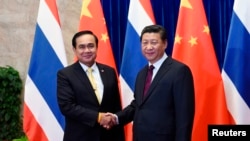Thai Prime Minister Prayuth Chan-ocha cited China as a good example of economic development in a year-end speech to government officials seven months after he seized power in a military coup.
Prayuth, a former army chief who led the coup, said Thais should “stop bickering” and look to regional superpower China for inspiration.
His speech on Thursday came after a two-day state visit to China aimed at forging closer ties with Beijing following a chill in relations with the U.S. and Europe.
Several Western nations imposed sanctions and downgraded ties with Thailand in response to the coup. Last week the regime used a regional summit in Bangkok as proof of what it called the international community's renewed confidence in Thailand.
“I spoke to Chinese President Xi Jinping and he told me that 60 years ago his country was [one of] the poorest in the world. In 30 years they were able to make their country a world economic superpower,” Prayuth said. “But we are still bickering amongst ourselves.”
The army seized control of the country in what it said was an attempt to calm more than six months of crisis that left nearly 30 people dead.
Among the many tasks Prayuth faces in 2015 are how to restore an ailing economy and roll out legislative changes aimed at preventing the return of ousted former Prime Minister Thaksin Shinawatra and his allies.
Thaksin, a populist former telecommunications tycoon, was ousted in a 2006 putsch and faces a two-year jail term for graft. Thailand has been divided for a decade between Thaksin and the Bangkok-based royalist military establishment, which sees him as a threat.
Despite some semblance of a return to normal, the Thai economy, Southeast Asia's second-largest, is stagnating.
It grew just 0.2 percent in the first nine months of this year. The central bank has cut its economic forecasts for 2014 and 2015.
Thailand is still under martial law following the coup, something that has kept visitors away and dented tourism, which accounts for around 10 percent of the economy.
Earlier this week the U.S. called a plan to delay a Thai general election to February 2016 “unwise and unjustified.”





